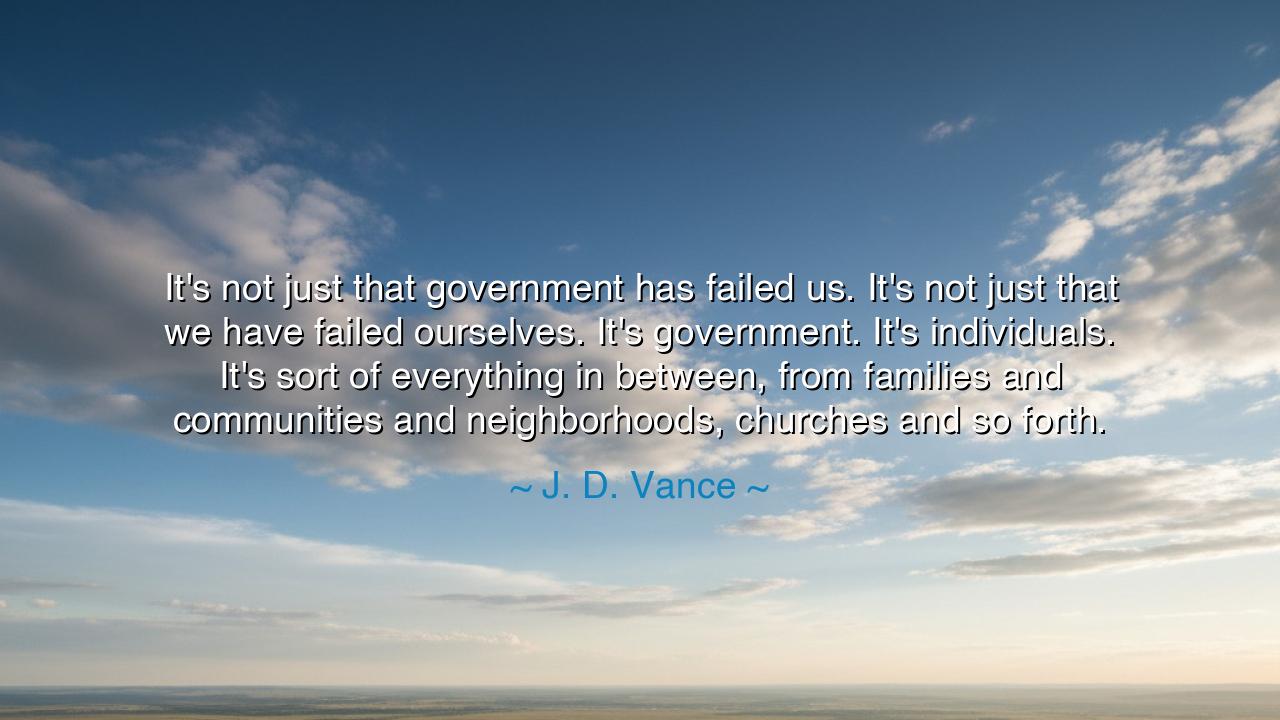
It's not just that government has failed us. It's not just that
It's not just that government has failed us. It's not just that we have failed ourselves. It's government. It's individuals. It's sort of everything in between, from families and communities and neighborhoods, churches and so forth.






In an age of division and despair, when people looked to their rulers for salvation and found none, when they turned inward and saw only weariness and blame, the writer and statesman J. D. Vance spoke words that pierce the heart of our shared condition:
"It's not just that government has failed us. It's not just that we have failed ourselves. It's government. It's individuals. It's sort of everything in between, from families and communities and neighborhoods, churches and so forth."
These words are neither accusation nor excuse; they are the voice of reckoning — a lament for the broken bonds of society and a call to remember that no single hand bears the weight of failure alone. Vance, born of the working-class hills of Ohio and Kentucky, speaks not as a philosopher gazing from a tower, but as one who has seen with his own eyes the fraying of the American spirit — families splintered, trust eroded, hope dimmed. His message is both humble and heroic: that the health of a nation does not lie in government alone, nor in individuals alone, but in the sacred web that connects them — the in-between, the space where human hearts meet in shared responsibility.
The meaning of his words is as ancient as civilization itself. For a society is not a machine, nor a collection of laws, nor a gathering of strangers bound by borders. It is a living organism, a harmony of many parts — the state, the people, the family, the faith. When one withers, all suffer. Government, though flawed, reflects the people who sustain it. Individuals, though free, are shaped by the institutions and communities that raise them. When both fail in concert, decay begins not at the edges but at the soul. Vance reminds us that the sickness of a nation is not cured by pointing fingers; it is cured by remembering that each layer of society is a mirror of the others — that leaders emerge from the people they serve, and the people become like the leaders they follow.
The origin of this wisdom lies in the story of his own people — the forgotten towns of Appalachia, where once there was pride and purpose, but where despair crept in when faith in both government and self began to fade. Factories closed, churches emptied, families broke apart. Some blamed the government for neglect; others blamed the people for apathy. But Vance saw the truth that lay between: both had fallen asleep to their duty. Government had ceased to nurture; individuals had ceased to strive. And between them, the community — that sacred fellowship of neighbor helping neighbor — had been left to crumble.
This lesson is not new. History is filled with civilizations that perished not from conquest, but from the slow rot of disconnection. Consider the fall of ancient Rome. The empire did not die in a single battle; it decayed from within. The citizens, once proud and disciplined, grew comfortable and disinterested. The government, bloated and corrupt, ruled in name but not in care. The institutions that once bound the people — family, virtue, faith — dissolved into vanity and greed. And so Rome, that mighty empire, collapsed not from invasion but from indifference — the same indifference Vance warns of today.
The wisdom in his quote lies in its refusal to accept easy answers. It is not enough to curse the government, for it is born of our own hands. It is not enough to blame the people, for they act within systems that shape their fate. The truth, as he speaks it, lives in between — in the bonds we have neglected: our families who need love, our neighbors who need help, our communities that need rebuilding. Each of these small realms of responsibility forms the bedrock upon which a great nation stands. When we abandon them, we abandon ourselves.
Vance’s call is a call to restoration, not resentment. He invites us to see that revival begins not in the halls of power, but in the humble spaces of everyday life — the dinner table, the church pew, the town hall, the helping hand extended to a friend. When individuals live with honor, when families nurture wisdom, when communities practice compassion, the government itself will reflect those virtues. But when each withdraws into selfishness and blame, no law or policy can save us. The cure for national decay, then, begins in the smallest of acts — in reconnection, in kindness, in courage.
Let this teaching be passed down as guidance to the generations: a society’s strength lies in the unity of its parts. The state cannot replace the family; the individual cannot replace the community. Each must play its role, not in isolation, but in harmony. Do not wait for salvation from above, nor sink into despair from below. Instead, rebuild the bridges between — between neighbor and neighbor, parent and child, citizen and servant. For it is in these quiet spaces that nations are healed, and it is from these humble beginnings that greatness once again takes root.
Thus ends the teaching: when government, individuals, and communities move together in purpose, they become one body, breathing with the rhythm of justice and compassion. But when they fall apart, even the strongest nation becomes fragile. Therefore, let every person become both servant and steward of the world between — that sacred realm where all true renewal begins.






AAdministratorAdministrator
Welcome, honored guests. Please leave a comment, we will respond soon